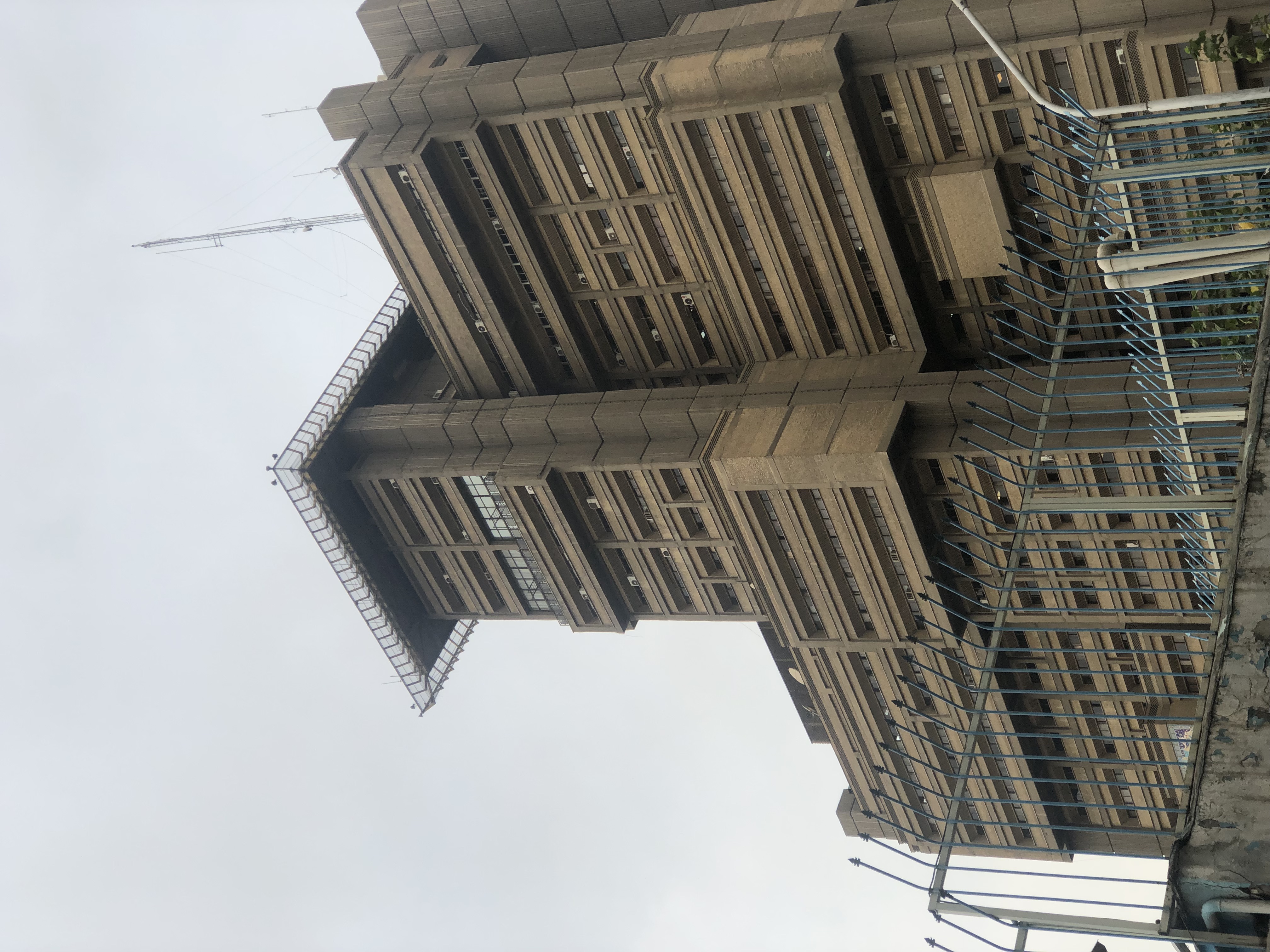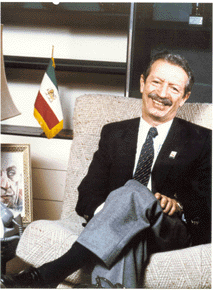|
Gholam Hossein Sadighi
Gholam-Hossein Sadighi (; 3 December 1905 – 28 April 1991) was an Iranian politician and Minister of Interior in the government of Prime Minister Mohammad Mosaddegh in 1953. After a CIA-backed coup d'etat overthrew Mossadegh, Sadighi was arrested and later testified in defense of Mossadegh at the latter's trial. Despite the loss of power, Sadighi continued to be politically active. He helped to create the Second National Front in 1960 and, along with other pro-Mossadegh politicians, advocated a democratic system and a Shah that reigns but does not rule. By 1978, Iran was gripped by mass turmoil and there was a significant danger that Mohammad Reza Pahlavi Mohammad Reza Pahlavi (26 October 1919 – 27 July 1980) was the last List of monarchs of Iran, Shah of Iran, ruling from 1941 to 1979. He succeeded his father Reza Shah and ruled the Imperial State of Iran until he was overthrown by the ... would be toppled by a mass rebellion led by Ayatollah Ruhollah Kho ... [...More Info...] [...Related Items...] OR: [Wikipedia] [Google] [Baidu] |
Ministry Of Interior (Iran)
The Ministry of Interior (, ''Vezârat-e Keshvar'') of the Iran, Islamic Republic of Iran is in charge of performing, supervising and reporting elections, police, policing, and other responsibilities related to an interior ministry. Duties * To provide and protect domestic security and establishment of peace and order across the country and coordination between intelligence, disciplinary, and military organs and protecting borders * To manage police affairs * To make an effort to achieve and develop political and social freedoms according to the constitution and other laws of the country and providing sustainable political and social development and promotion of public participation * To protect and preserve the achievements of I.R. of Iran through public participations * To provide conditions of appropriate practice of political and nongovernmental parties and formations and supervision on their activities * To guide, lead and support of Islamic councils and supervision on their ... [...More Info...] [...Related Items...] OR: [Wikipedia] [Google] [Baidu] |
Ayatollah Ruhollah Khomeini
Ruhollah Musavi Khomeini (17 May 1900 or 24 September 19023 June 1989) was an Iranian revolutionary, politician, political theorist, and religious leader. He was the founder of the Islamic Republic of Iran and the main leader of the Iranian Revolution, which overthrew Mohammad Reza Pahlavi, and served as the first supreme leader of Iran, the highest-ranking political and religious authority of the Islamic Republic until his death in 1989. Born in Khomeyn, in what is now Iran's Markazi province, his father was murdered when Khomeini was two years old. He began studying the Quran and Arabic from a young age assisted by his relatives. Khomeini became a high ranking cleric in Twelver Shi'ism, an ''ayatollah'', a ''marja''' ("source of emulation"), a ''mujtahid'' or ''faqīh'' (an expert in ''fiqh''), and author of more than 40 books. His opposition to the White Revolution resulted in his state-sponsored expulsion to Bursa in 1964. Nearly a year later, he moved to Najaf, where ... [...More Info...] [...Related Items...] OR: [Wikipedia] [Google] [Baidu] |
National Front (Iran) Politicians
National Front or Front National can refer to the following political parties and coalitions: Africa * Botswana National Front * National Front for the Salvation of Libya * Namibia National Front * Front National (South Africa), a Boer-Afrikaner political party in South Africa * South African National Front, neo-fascist organisation associated with the British National Front * Swaziland National Front, a political party in Swaziland Asia * Chin National Front, a political and military organization in Burma * Mizo National Front, India * National Front (India) * National Front (Iran) (''Jebhe-ye Melli Iran'') * Barisan Nasional (National Front) in Malaysia * Balawaristan National Front, Pakistan * United National Front (Sri Lanka) Europe * National Front (Albania) * Partyja BPF, Belarus * National Front (Belgium) * Bulgarian National Front * National Front (Czechoslovakia) * National Front (East Germany) * Rahvarinne, Estonia * Finnish People's Blue-whites, known as Nat ... [...More Info...] [...Related Items...] OR: [Wikipedia] [Google] [Baidu] |
Interior Ministers Of Iran
Interior may refer to: Arts and media * ''Interior'' (Degas) (also known as ''The Rape''), painting by Edgar Degas * ''Interior'' (play), 1895 play by Belgian playwright Maurice Maeterlinck * ''The Interior'' (novel), by Lisa See * Interior design, the trade of designing an architectural interior * ''The Interior'' (Presbyterian periodical), an American Presbyterian periodical * Interior architecture, process of designing building interiors or renovating existing home interiors Places * Interior, South Dakota * Interior, Washington * Interior Township, Michigan * British Columbia Interior, commonly known as "The Interior" Government agencies * Interior ministry, sometimes called the ministry of home affairs * United States Department of the Interior Other uses * Interior (topology), mathematical concept that includes, for example, the inside of a shape * Interior FC, a football team in Gambia See also * * * List of geographic interiors * Interiors (other) * ... [...More Info...] [...Related Items...] OR: [Wikipedia] [Google] [Baidu] |
Government Ministers Of Iran
A government is the system or group of people governing an organized community, generally a state. In the case of its broad associative definition, government normally consists of legislature, executive, and judiciary. Government is a means by which organizational policies are enforced, as well as a mechanism for determining policy. In many countries, the government has a kind of constitution, a statement of its governing principles and philosophy. While all types of organizations have governance, the term ''government'' is often used more specifically to refer to the approximately 200 independent national governments and subsidiary organizations. The main types of modern political systems recognized are democracies, totalitarian regimes, and, sitting between these two, authoritarian regimes with a variety of hybrid regimes. Modern classification systems also include monarchies as a standalone entity or as a hybrid system of the main three. Historically prevalent for ... [...More Info...] [...Related Items...] OR: [Wikipedia] [Google] [Baidu] |
1991 Deaths
This is a list of lists of deaths of notable people, organized by year. New deaths articles are added to their respective month (e.g., Deaths in ) and then linked below. 2025 2024 2023 2022 2021 2020 2019 2018 2017 2016 2015 2014 2013 2012 2011 2010 2009 2008 2007 2006 2005 2004 2003 2002 2001 2000 1999 1998 1997 1996 1995 1994 1993 1992 1991 1990 1989 1988 1987 1986 Earlier years ''Deaths in years earlier than this can usually be found in the main articles of the years.'' See also * Lists of deaths by day * Deaths by year (category) {{DEFAULTSORT:deaths by year ... [...More Info...] [...Related Items...] OR: [Wikipedia] [Google] [Baidu] |
1905 Births
As the second year of the massive Russo-Japanese War begins, more than 100,000 die in the largest world battles of that era, and the war chaos leads to the 1905 Russian Revolution against Nicholas II of Russia (Dmitri Shostakovich, Shostakovich's Symphony No. 11 (Shostakovich), 11th Symphony is subtitled ''The Year 1905'' to commemorate this) and the start of Revolution in the Kingdom of Poland (1905–07), Revolution in the Kingdom of Poland. Canada and the U.S. expand west, with the Alberta and Saskatchewan provinces and the founding of Las Vegas. 1905 is also the year in which Albert Einstein, at this time resident in Bern, publishes his four Annus Mirabilis papers, ''Annus Mirabilis'' papers in ''Annalen der Physik'' (Leipzig) (March 18, May 11, June 30 and September 27), laying the foundations for more than a century's study of theoretical physics. Events January * January 1 – In a major defeat in the Russo-Japanese War, Russian General Anatoly Stessel su ... [...More Info...] [...Related Items...] OR: [Wikipedia] [Google] [Baidu] |
Abadan Crisis
The Abadan Crisis ( ''Bohrân Nafti Irân'', "Iran Oil Crisis") occurred from 1951 to 1954, after Iran nationalised the Iranian assets of the BP controlled Anglo-Iranian Oil Company (AIOC) and expelled Western companies from oil refineries in the city of Abadan. Prelude The AIOC was the United Kingdom's "single largest overseas asset" and a "source of national pride" in the British post-war era of Clement Attlee and Ernest Bevin. Even as late as the "1940s and early 1950s some high British officials still believed that Persian petroleum was actually and rightly British petroleum because it had been discovered by the British, developed by British capital, and exploited through British skill and British ingenuity." In stark contrast, Iranian Premier Mohammad Mosaddegh believed the 1933 concession granted to the AIOC by Iran was "immoral as well as illegal". Mosaddeq "challenged every aspect of the British commercial presence in Iran". The British feared that if Mosaddeq's policie ... [...More Info...] [...Related Items...] OR: [Wikipedia] [Google] [Baidu] |
1953 Iranian Coup D'état
The 1953 Iranian coup d'état, known in Iran as the 28 Mordad coup d'état (), was the overthrow of Prime Minister Mohammad Mosaddegh on 19 August 1953. Led by the Iranian army and supported by the United States and the United Kingdom, the coup aimed at strengthening the autocratic rule of the shah Mohammad Reza Pahlavi. A key motive was to protect British oil interests in Iran after its government refused to concede to western oil demands. It was instigated by the United States (under the name TP-AJAX Project or Operation Ajax) and the United Kingdom (under the name Operation Boot). This began a period of dissolution for Iranian democracy and society. Mosaddegh had sought to audit the documents of the Anglo-Iranian Oil Company (AIOC), a British corporation (now part of BP), to verify that AIOC was paying the contracted royalties to Iran, and to limit the company's control over Iranian oil reserves. Upon the AIOC's refusal to cooperate with the Iranian government, the parl ... [...More Info...] [...Related Items...] OR: [Wikipedia] [Google] [Baidu] |
Shapour Bakhtiar
Shapour Bakhtiar (, ; 26 June 19146 August 1991) was an Iranian politician who served as the last Prime Minister of Iran under the rule of Mohammad Reza Pahlavi. In the words of the historian Abbas Milani: "more than once in the tone of a jeremiad he reminded the nation of the dangers of clerical despotism, and of how the fascism of the mullahs would be darker than any military junta." In 1991, he and his secretary were murdered in his home in Suresnes, France, by agents of the Islamic Republic. Early life Bakhtiar was born on 26 June 1914 in southwestern Iran into a family of Iranian tribal nobility, the family of the paramount chieftains of the then powerful Bakhtiari tribe. His father, Mohammad Reza Khan (''Sardar-e-Fateh''), and his mother, Naz-Baygom, were both Lurs and Bakhtiaris. Bakhtiar's maternal grandfather, Najaf-Gholi Khan Samsam ol-Saltaneh, had been appointed prime minister twice, in 1912 and 1918. Bakhtiar's mother died when he was seven. His father was execu ... [...More Info...] [...Related Items...] OR: [Wikipedia] [Google] [Baidu] |
Shah
Shāh (; ) is a royal title meaning "king" in the Persian language.Yarshater, Ehsa, ''Iranian Studies'', vol. XXII, no. 1 (1989) Though chiefly associated with the monarchs of Iran, it was also used to refer to the leaders of numerous Persianate societies, such as the Ottoman Empire, the Khanate of Bukhara and the Emirate of Bukhara, the Mughal Empire, the Bengal Sultanate, and various Afghan dynasties, as well as among Gurkhas. With regard to Iranian history, in particular, each ruling monarch was not seen simply as the head of the concurrent dynasty and state, but as the successor to a long line of royalty beginning with the original Persian Empire of Cyrus the Great. To this end, he was more emphatically known as the Shāhanshāh ( ), meaning " King of Kings" since the Achaemenid dynasty. A roughly equivalent title is Pādishāh (; ), which was most widespread during the Muslim period in the Indian subcontinent. Etymology The word descends from Old Persian ... [...More Info...] [...Related Items...] OR: [Wikipedia] [Google] [Baidu] |







